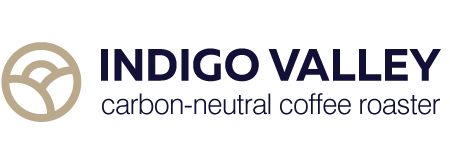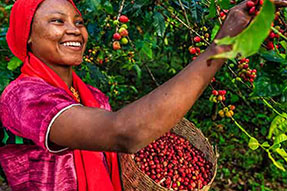Anti-Slavery Week 2021
21st October: Spotting the signs
During Anti-slavery Week 2021 we will be using our blog to share about Hope For Justice as well as their incredible work in fighting against exploitation, rescuing victims, restoring lives and reforming our society.
Thanks for joining us with our daily posts, you can view our previous blogs from this week in our main blog menu.
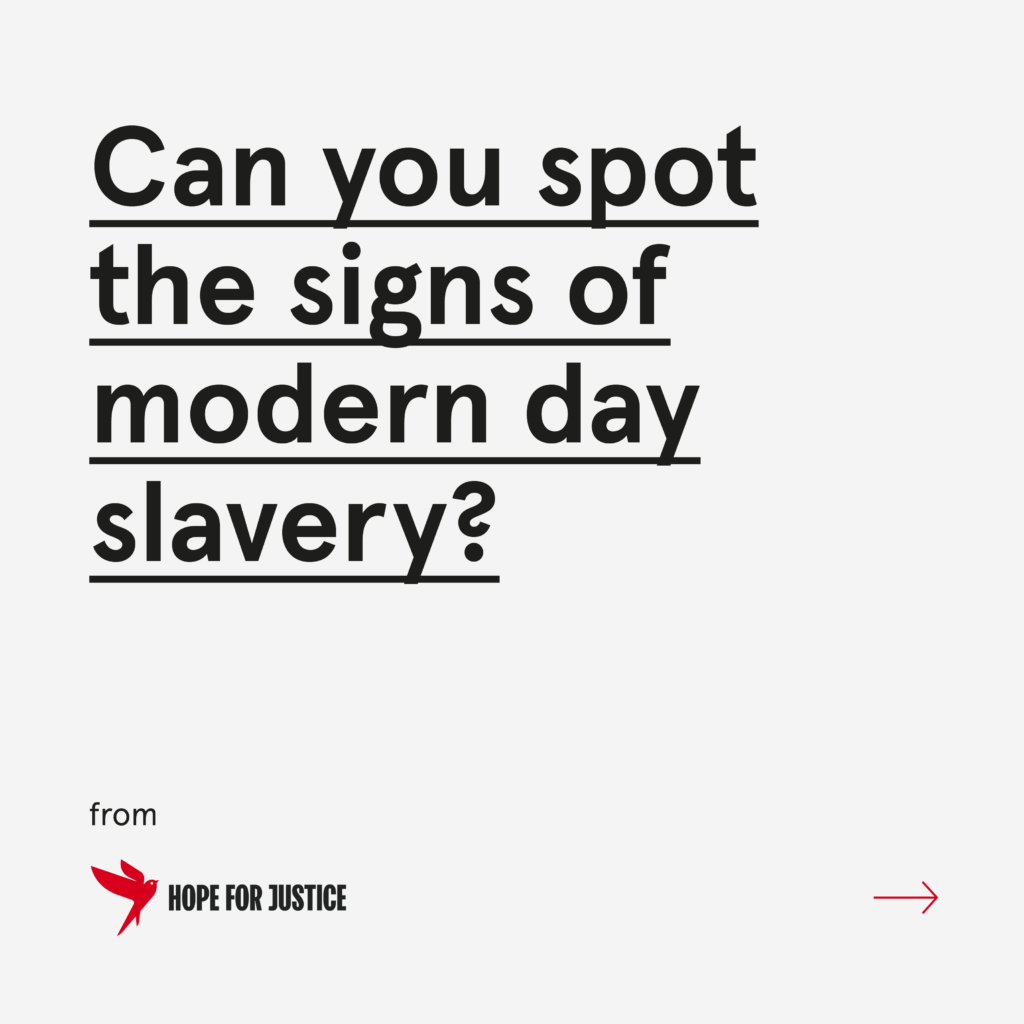
Awareness can save lives
Human trafficking is happening all around us. Victims are often hidden away, but it is possible you will encounter individuals or situations of concern. Knowing how to ‘spot the signs’ could save lives.
The indicators below should be considered together and even if you are able to apply one or two or even three of the indicators to a person they are not necessarily trafficked. However, if you have any suspicions about human trafficking in your area you should report it.
Six Key Areas to Know
1. General Indicators
Trafficking victims are often lured into another country by false promises and so may not easily trust others. They may:
Be fearful of police/authorities
Be fearful of the trafficker, believing their lives or family members’ lives are at risk if they escape
Exhibit signs of physical and psychological trauma e.g. anxiety, lack of memory of recent events, bruising, untreated conditions
Be fearful of telling others about their situation
Be unaware they have been trafficked and believe they are simply in a bad job
Have limited freedom of movement
Be unpaid or paid very little
Have limited access to medical care
Seem to be in debt to someone
Have no passport or mention that someone else is holding their passport
Be regularly moved to avoid detection
Believe they are being controlled by use of witchcraft
2. Sexual Exploitation
Be aware: ordinary residential housing/hotels are being used more and more for brothels. People forced into sexual exploitation may:
Be moved between brothels, sometimes from city to city
Sleeping on work premises
Display a limited amount of clothing, of which a large proportion is sexual
Display substance misuse
Be forced, intimidated or coerced into providing sexual services
Be subjected to abduction, assault or rape
Be unable to travel freely e.g. picked up and dropped off at work location by another person
Have money for their services provided collected by another person
5. Forced Labor
Where all the work is done under the menace of a penalty or the person has not offered himself voluntarily and is now unable to leave. They may experience:
Threat or actual physical harm
Restriction of movement or confinement
Debt bondage i.e. working to pay off a debt or loan, often the victim is paid very little or nothing at all for their services because of deductions
Withholding of pay or excessive reductions
Withholding of documents e.g. passport/security card
Threat of revealing to authorities an irregular immigration status
Their employer is unable to produce documents required
Poor or non-existent health and safety standards
Requirement to pay for tools and food
Imposed place of accommodation (and deductions made for it)
Pay that is less than minimum wage
Dependence on employer for services
No access to labor contract
Excessive work hours/few breaks
4. Child Abuse
“An abuse of a child’s vulnerability by a person’s position of power or trust, exploiting that position to obtain sexual services in exchange for some form of favour such as alcohol, drugs, attention or gifts” – Hope for Justice Engage Team, Blackburn
You may notice a child that is:
Often going missing/truanting
Secretive
Has unexplained money/presents
Experimenting with drugs/alcohol
Associating with/being groomed by older people (not in normal networks)
In relationships with significantly older people
Taking part in social activities with no plausible explanation
Seen entering or leaving vehicles with unknown adults
Showing evidence of physical/sexual assault (including STD’s)
Showing signs of low self image/self harm/eating disorder
Criminal Activities
The person is recruited and forced/deceived into conducting some form of criminal activity such as pick pocketing, begging, cannabis cultivation and benefit fraud.
Same indicators as for forced labour but for cannabis cultivation you may also notice:
Windows of property are permanently covered from the inside
Visits to property are at unusual times
Property may be residential
Unusual noises coming from the property e.g. machinery
Pungent smells coming from the property
Domestic Servitude
A particularly serious form of denial of freedom; this includes the obligation to provide certain services and the obligation to live on another person property without the possibility of changing those circumstances. They may:
Be living and working for a family in a private home
Not be eating with the rest of the family
Have no bedroom or proper sleeping place
Have no private space
Be forced to work excessive hours; “on call” 24 hours a day
Never leave the house without the ‘employer’
Be malnourished
Be reported as missing or accused of crime by their ‘employer’ if they try to escape
Download and share this flyer for spotting the signs of modern-slavery: Click Here
Indicators of Modern Slavery
Modern salvery in our society might look different than you imagine. As well as the general indicators above, how could you spot a victim in workplaces or common places your visit?
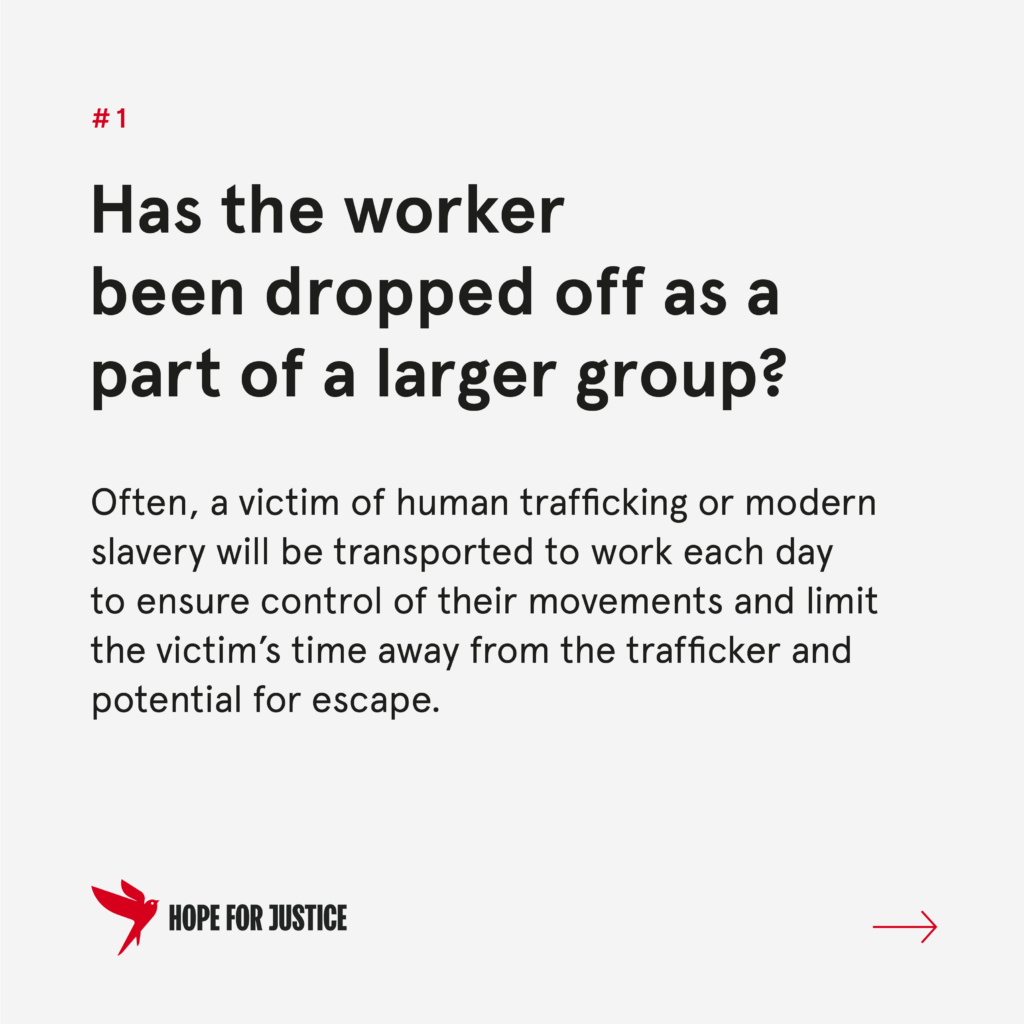
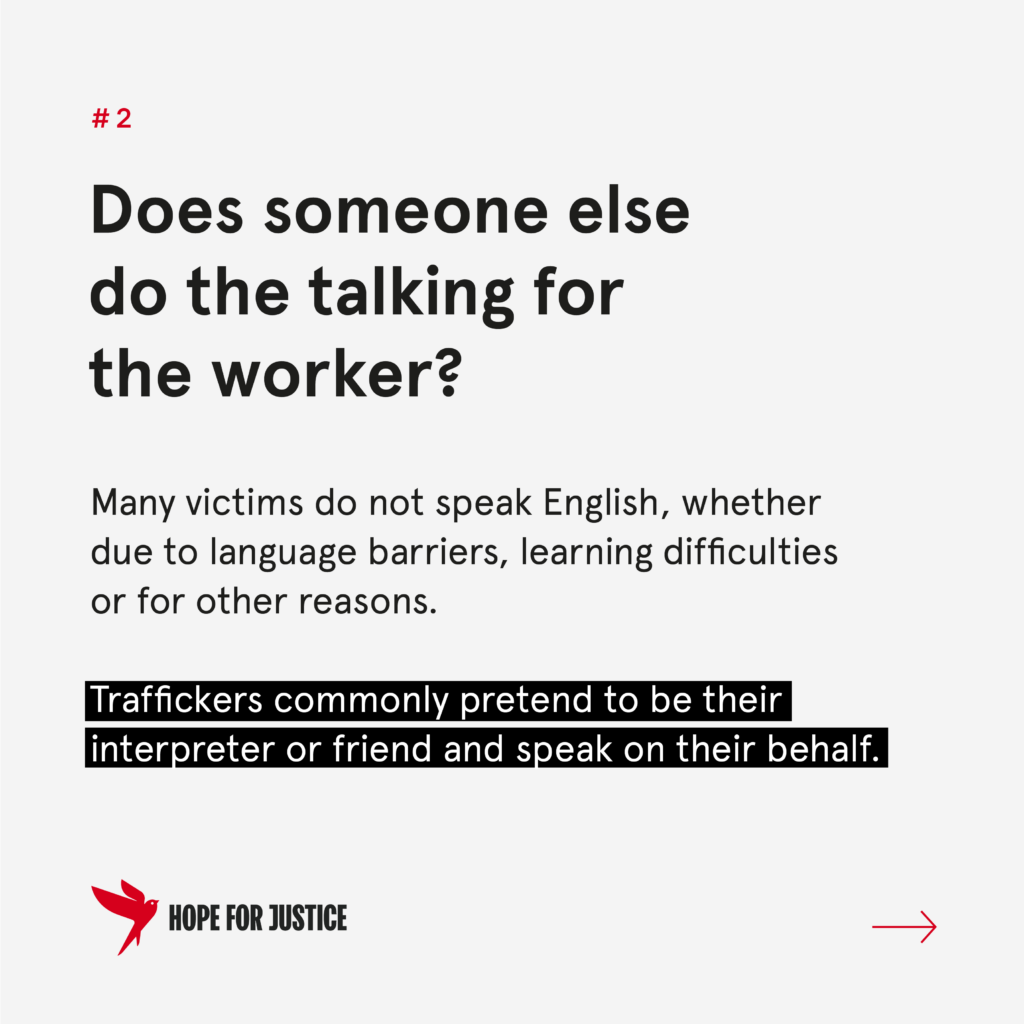
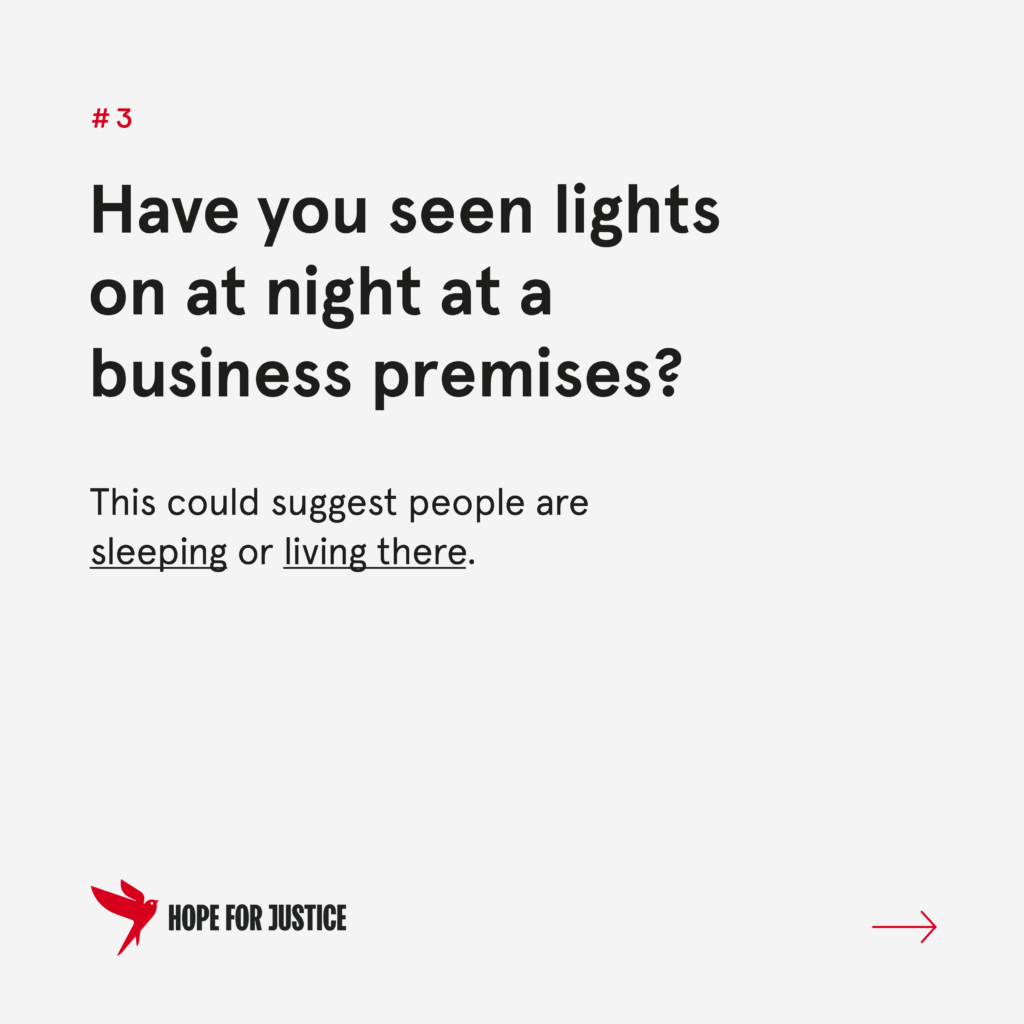
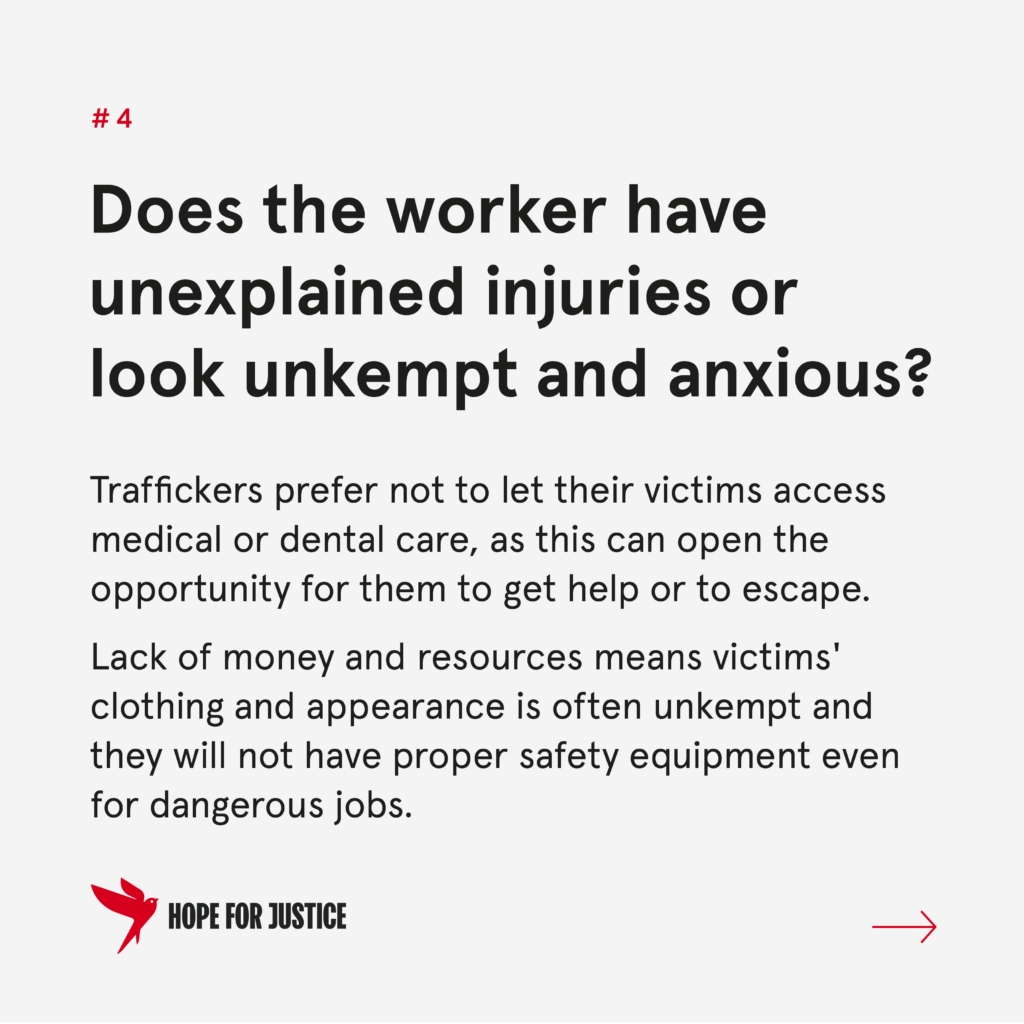
Reporting in the UK:
Contact Hope for Justice on 0300 008 8000 (local rate call) or email [email protected] to report a concern. Hope for Justice’s helpline is open during office hours only; if you cannot reach them, we advise that you call Crimestoppers (anonymously) on 0800 555 111.
IMPORTANT: If you have reason to believe a person is
in immediate danger you should call the police first.

Interested in more?
Looking for more articles about coffee and coffee equipment from Indigo Valley? Why not view our archive of posts and articles for everything you need to know about coffee.
